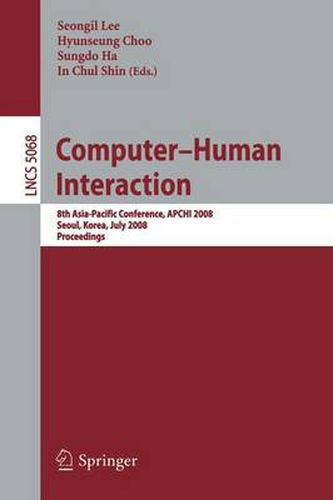Readings Newsletter
Become a Readings Member to make your shopping experience even easier.
Sign in or sign up for free!
You’re not far away from qualifying for FREE standard shipping within Australia
You’ve qualified for FREE standard shipping within Australia
The cart is loading…






This title is printed to order. This book may have been self-published. If so, we cannot guarantee the quality of the content. In the main most books will have gone through the editing process however some may not. We therefore suggest that you be aware of this before ordering this book. If in doubt check either the author or publisher’s details as we are unable to accept any returns unless they are faulty. Please contact us if you have any questions.
Welcome to the proceedings of APCHI 2008, the 8th Asia-Pacific Conference on Computer-Human Interaction held in Seoul, Korea. Following the success of the preceding APCHI conferences, in Singapore (1996, 2000), Australia (1997), Japan (1998), China (2002), New Zealand (2004) and Taiwan (2006), the 8th APCHI brought together the researchers, developers, practitioners, and educators in the field of human-computer interaction. APCHI has been a major forum for scholars and practitioners in the Asia-Pacific region on the latest challenges and developments in HCI. Theoretical breakthroughs and practical systems and interfaces were presented at this 2008 conference, thanks to the support of KADO, the HCI ITRC of Sungkyu- wan University, and KIST. APCHI 2008 featured a comprehensive program including keynote speeches, regular paper presentations, poster, demos, and special panel sessions. To address the challenge of socially blending ubiquitous computing technologies and a wider sp- trum of people with a variety of skills, knowledge, and capabilities, APCHI 2008 set Universal and Ubiquitous as the conference theme. APCHI 2008 attracted a total of 151 paper submissions. Among such a large number of submissions, 45 full papers were accepted as submitted or with minor revisions. All papers were reviewed by at least two reviewers. For the remaining submissions, 41 were recommended to change according to the reviews and were submitted as extended abstracts and posters. One special session with six invited papers was organized to support the conference theme of Universal and Ubiquitous.
$9.00 standard shipping within Australia
FREE standard shipping within Australia for orders over $100.00
Express & International shipping calculated at checkout
This title is printed to order. This book may have been self-published. If so, we cannot guarantee the quality of the content. In the main most books will have gone through the editing process however some may not. We therefore suggest that you be aware of this before ordering this book. If in doubt check either the author or publisher’s details as we are unable to accept any returns unless they are faulty. Please contact us if you have any questions.
Welcome to the proceedings of APCHI 2008, the 8th Asia-Pacific Conference on Computer-Human Interaction held in Seoul, Korea. Following the success of the preceding APCHI conferences, in Singapore (1996, 2000), Australia (1997), Japan (1998), China (2002), New Zealand (2004) and Taiwan (2006), the 8th APCHI brought together the researchers, developers, practitioners, and educators in the field of human-computer interaction. APCHI has been a major forum for scholars and practitioners in the Asia-Pacific region on the latest challenges and developments in HCI. Theoretical breakthroughs and practical systems and interfaces were presented at this 2008 conference, thanks to the support of KADO, the HCI ITRC of Sungkyu- wan University, and KIST. APCHI 2008 featured a comprehensive program including keynote speeches, regular paper presentations, poster, demos, and special panel sessions. To address the challenge of socially blending ubiquitous computing technologies and a wider sp- trum of people with a variety of skills, knowledge, and capabilities, APCHI 2008 set Universal and Ubiquitous as the conference theme. APCHI 2008 attracted a total of 151 paper submissions. Among such a large number of submissions, 45 full papers were accepted as submitted or with minor revisions. All papers were reviewed by at least two reviewers. For the remaining submissions, 41 were recommended to change according to the reviews and were submitted as extended abstracts and posters. One special session with six invited papers was organized to support the conference theme of Universal and Ubiquitous.